Paper bags are everywhere, from grocery aisles to takeout counters and boutique shops. They seem like the greener alternative to plastic, but are they really as eco-friendly as they look?
In this guide, you’ll find out which types of paper bags are actually recyclable, how to dispose of them properly, and creative ways to reuse them at home or in business.
Let’s break it down together and make disposal a little clearer.
Are Paper Bags Recyclable?
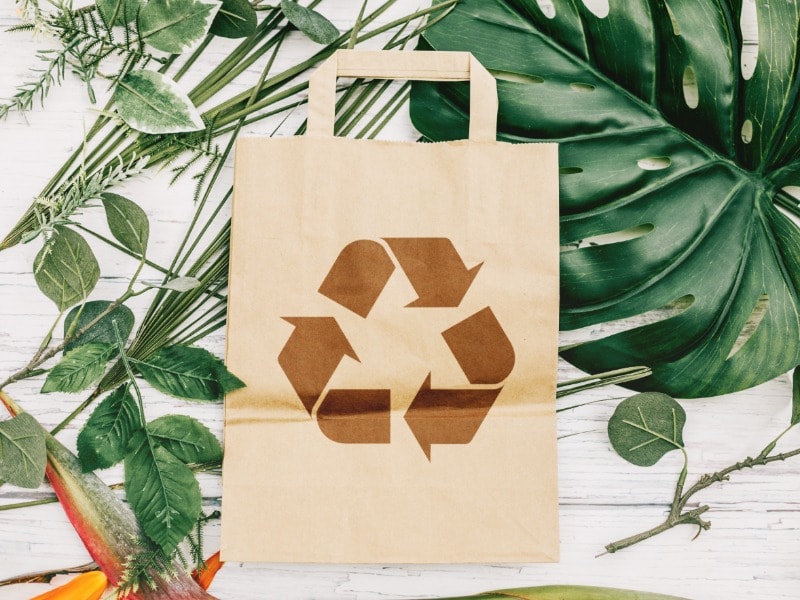
Most paper bags are recyclable, but only under the right conditions. What matters is not just the material itself, but what it has been exposed to.
A plain paper bag made from kraft pulp or recycled fibers is generally accepted by recycling facilities across the globe. Recycling facilities can easily break down and repurpose them into new paper products.
However, contamination is a common problem. Grease, food stains, or adhesive residue can ruin an entire batch of paper. If a bag is oily or sticky, the collection center may reject it to avoid clogging machinery or reducing the quality of recovered fibers.
Coated paper bags also raise concerns. Many retail, takeaway, and gift bags feature glossy finishes, plastic laminations, or metallic detailing that prevents them from breaking down in standard recycling processes.
If a paper bag tears cleanly and has no plastic sheen, it’s more likely to be recyclable. Before tossing a bag into the blue bin, check if it’s:
- Clean and dry
- Free from food stains or grease
- Uncoated and free of plastic or foil layers
If it meets those conditions, it can usually be recycled. If not, compost or general waste may be a better option.
Are Brown Paper Bags Recyclable?
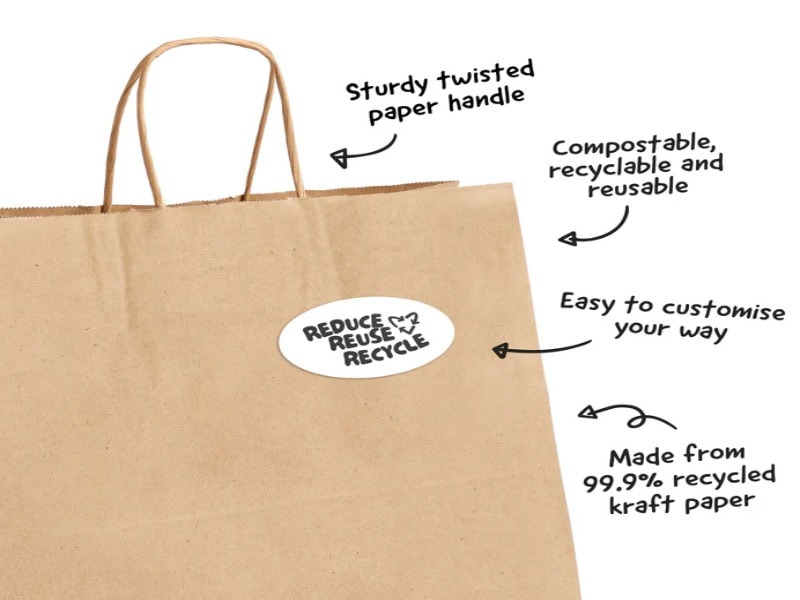
Yes, brown paper bags, especially the standard kraft grocery type, are highly recyclable when handled properly.
These bags are made from unbleached wood pulp and are free from coatings or synthetic additives. Because of their simple construction, they break down quickly during reprocessing.
This is why curbside recycling programs accept them. Brown paper bags are also one of the easiest paper products to manage at both the household and commercial levels.
Grocery stores, bakeries, and restaurants often choose them for this exact reason.
Paper bag factories and manufacturers typically produce these in bulk for wholesale and retail packaging, especially for businesses looking to reduce plastic use.
However, even brown paper bags have limitations.
Once they absorb grease, sauces, or food residue, as is often the case with takeout orders, they are no longer recyclable. Recycling facilities reject soiled paper to maintain the purity of the recovered pulp. A greasy bag can contaminate the rest of the batch.
Here’s how to handle them:
- Recycle if the bag is dry and free of stains
- Compost if lightly soiled, and your city allows it
- Trash if it’s soaked or sticky
Brown kraft bags are recyclable by design, but only when clean. Businesses should choose uncoated options, and households should check for food residue before disposal.
How to Recycle Paper Bags Properly
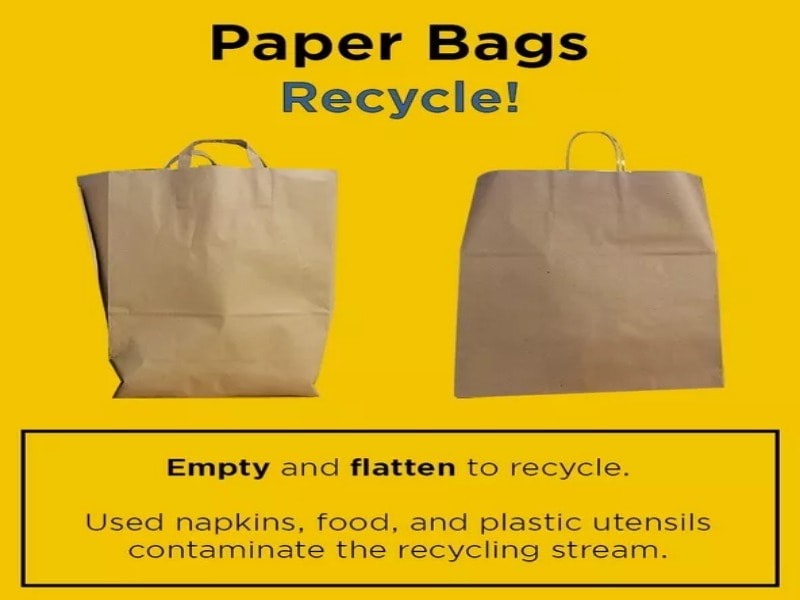
Recycling paper bags might seem simple, but doing it right ensures they don’t end up in the landfill. Let’s take a look at how to dispose of paper bags the environmentally-friendly way.
Remove Stickers, Receipts, and Non-Paper Parts
Before recycling a paper bag, check for anything that isn’t paper. That includes receipts, barcode labels, stickers, rope handles, and plastic windows.
These materials interfere with the recycling process and can lower the quality of the recovered pulp. To fully recycle the paper bags, you must remove all non-paper elements.
A clean start ensures your bag doesn’t get rejected at the sorting facility.
Flatten Bags to Save Space and Improve Processing
Flattening paper bags before putting them in the recycling bin helps more than just save space. It improves bag handling and processing at materials recovery facilities.
Crumpled bags clog sorting lines or get misclassified as trash. Whether you’re tossing lunch bags or grocery sacks, always fold them down neatly. Clean, dry, and flat bags are much easier to recycle efficiently.
Place in Curbside Recycling or Drop-Off Bins
Most cities and towns accept recyclable paper bags in their curbside recycling programs or at the collection centers. Just make sure your bag is uncoated, clean, and free of grease.
If you live in a region with separate recycling systems, look for the nearest paper collection point.
Bulk paper bag users, like restaurants or retailers, use commercial recycling services for larger volumes. Always follow local guidelines for proper paper bag disposal.
Compost Soiled or Greasy Bags Instead of Recycling
Grease-stained or food-contaminated paper bags should not go in the recycling bin. Instead, check if your city offers organic waste pickup or home composting options.
Paper bags that have absorbed oils or sauces break down easily in compost, supporting eco-friendly disposal.
If your region accepts food-soiled paper in compost, use this route for takeout bags, bakery wraps, or anything that’s not dry.
Benefits of Recycling Paper Bags
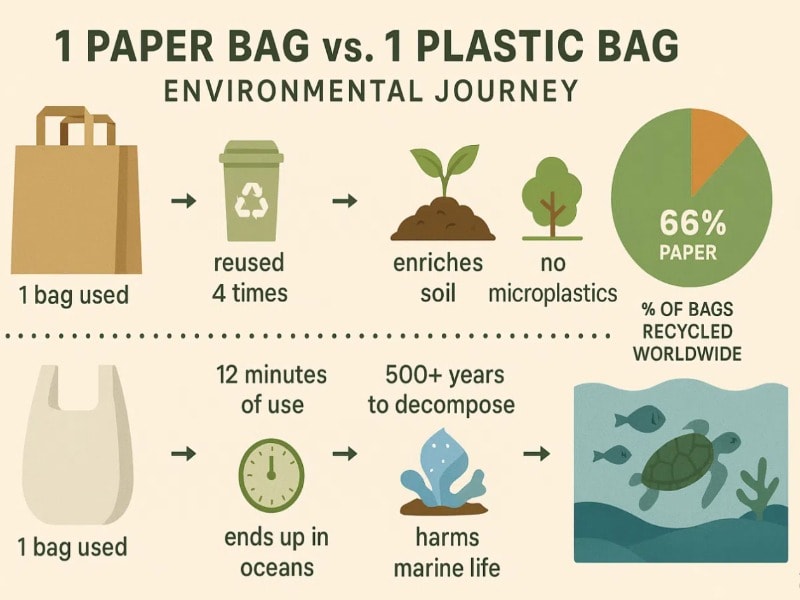
Let’s take a look at why recycling paper bags matters.
Keeps Paper Bags Out of Landfills
Every recycled bag is one less in the landfill. When you toss paper bags with trash, they take up valuable space and release methane as they break down. By placing used kraft bags in recycling or compost, you help reduce overall waste and make better use of available landfill capacity.
Saves Trees and Raw Materials
It takes a lot of water, energy, and timber to make paper from scratch.
According to recycling centers, recycling just one ton of paper saves around 7,000 gallons (27,000 liters) of water, 17 mature trees, and enough energy to power an average home for six months.
Reusing the fibers from old paper bags means fewer natural resources are used. This supports eco-conscious sourcing and helps preserve forests for future generations.
Reduces Energy Use in Manufacturing
Making new paper from recycled fibers takes less energy than starting fresh with virgin pulp. That’s one big reason why more manufacturers and wholesale suppliers are choosing circular systems.
When recycled paper is part of the loop, the energy demands drop. That means less electricity, fewer emissions, and a smarter way to produce packaging that works. Cleaner inputs lead to cleaner outputs, and the whole process gets easier on the environment.
Supports the Circular Economy
When businesses and consumers recycle paper packaging correctly, those materials re-enter the supply chain.
A recycled paper bag might become a cereal box, notebook, or new bag. This closed-loop system reduces waste and supports local recycling industries. It’s one of the easiest ways to promote sustainability in everyday life.
Creative Reuse Ideas for Paper Bags
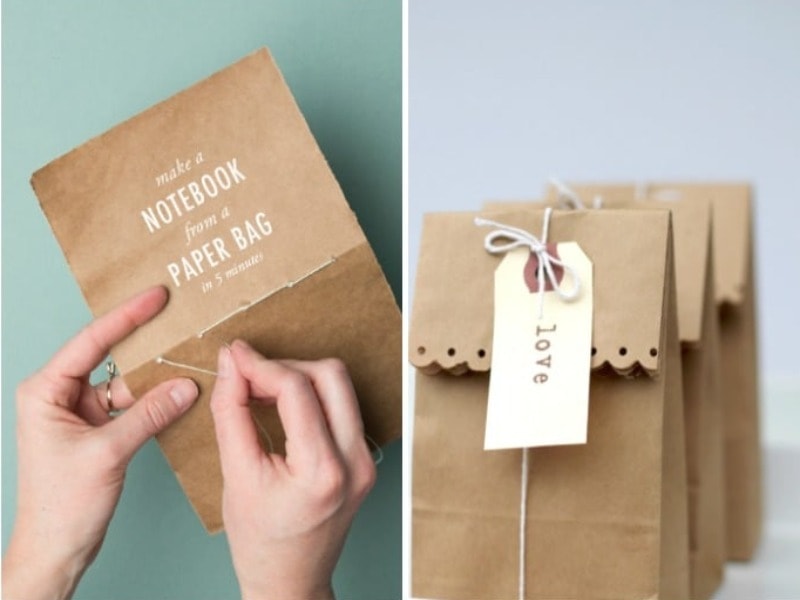
Before you crumple and toss it, think again, that humble paper bag might just be your next wrapping paper, storage hack, or art supply.
Here’s how you can reuse paper bags:
- Wrap small gifts in rustic brown paper
- Cover school books or journals at home
- Cut into craft paper for kids’ projects
- Line compost bins with breathable layers
- Store onions or garlic in the pantry
A plain kraft paper bag becomes more than just packaging. For households, it’s a zero-cost way to wrap presents, line drawers, or organize recyclables.
Parents can turn them into painting mats, drawing canvases, or papier-mache bases for school assignments.
Retailers and cafes can repurpose extra bags to hold food scraps or prep materials. Even damaged or torn bags can serve a purpose; just flatten and reuse them as padding for fragile items.
With a little imagination, paper bags end up reducing waste and saving money across both home and business settings.
Common Questions About Recycling Paper Bags
Can I recycle paper bags with food stains?
No. You should not place paper bags contaminated with grease, oil, or food residue in recycling bins. These should go into compost if accepted, or otherwise be thrown away to avoid contaminating clean recyclables.
Can paper bags go in the blue recycling bin?
Yes, paper bags that are clean, dry, and uncoated are accepted in most curbside blue bins. Always remove non-paper parts like handles, stickers, or receipts before recycling.
Are luxury paper bags recyclable?
Sometimes. Many luxury paper bags can be recycled only if plastic films, foil stamps, or rope handles are removed first. If the surface has a glossy or laminated finish, it likely belongs in the trash.
Can brown paper bags be composted?
Yes. Brown kraft paper bags break down quickly and are safe for home or industrial composting as long as they are free of ink, tape, or plastic coatings. Even lightly greasy bags can go in the compost.
Are recycled paper bags available for businesses?
Yes. Many paper bag manufacturers and suppliers offer custom designs made from 100% recycled content. Look for FSC-certified vendors or eco-packaging wholesalers for bulk orders.
Wrapping Up
Ditch plastic for good and switch to something that fits your values, such as paper bags, including brown grocery bags that are recyclable, reusable, and biodegradable.
Just keep them clean and uncoated, and dispose of them responsibly by recycling or composting. By doing so, you reduce waste, conserve resources, and contribute to a more sustainable planet.
Go Green with Sustainable Packaging
Looking for eco-friendly, recyclable paper bags? We provide customizable kraft and recycled paper bags that align with your brand’s sustainability goals.
Whether you run a boutique, restaurant, or e-commerce store, Tendee is your trusted paper bag manufacturer and wholesale supplier based in China, offering sustainable packaging for businesses worldwide.
Show your customers you care. Switch to recyclable paper bags today.





